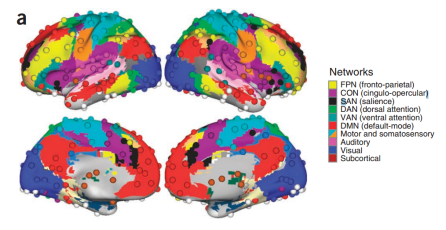My husband read my post below and, essentially, said, “Huh?” He suggested I keep it simple and get right to the answer to the question posed above. Here it is: A big-deal study showed that, contrary to expectations, marijuana (mj) had no effect on ADHD-related brain differences. It had effects on the brain, of course, but these effects were separate from the effects of ADHD. Details and other results, which are the ones of more interest to me, below.
An impressive group of scholars got together to examine the mj + ADHD question using 21- to 25-year-olds followed since elementary school as part of a large multi-site longitudinal study of ADHD known as MTA. Comparing mj users (who used at least once/week) & non-users with & without ADHD, the group expected to find that mj intensifies ADHD-related brain alterations. They, essentially, thought mj would add insult to injury (the injury being the decreased “integrity of functional networks” seen with ADHD).

But they found no one-two punch.
ADHD was associated with decreased integrity of functional networks responsible for executive function and somatomotor control, but mj affected different functional networks.
Interesting to me is that one of the mj-affected networks was the default mode network, which, when you have ADHD, fails to cooperate with the task-positive network (for more on this). It raises the question of whether mj has an indirect effect on ADHD symptoms, even if no direct one. (The other mj-affected network was the lateral visual one.)
Also interesting to me is that ADHD was associated with INCREASED functional network integrity for two networks: 1) “stronger integration of right posterior parietal cortex” within the dorsal attention network & 2) “stronger integration of left inferior premotor region within the cingulo-opercular network.” For 1, think spatial orientation toward what’s relevant and, for 2, think maintaining alertness.
The researchers described the first strengthening (1 above) as “maladaptive” because of its association with slower processing speed for those without ADHD.
But they saw the second (2 above) as helpful and suggest it “may reflect a compensatory adaptation – the strengthening of connections or recruitment of additional brain regions” for the sake of “maintaining normal cognitive performance.”
In almost a side-note kind of way, they note that their data support that ADHD-related differences seen within the somatomotor network “are a good candidate for imaging-based prediction of ADHD diagnosis,” as suggested by earlier research. Wow.

I think there is a flaw in the study. I couldn’t find any mention of cannabis strains or the dominant cannabinoids and terpenes. Not sure how much research has been done, but there a distinct differences in the effects of cannabis depending on the levels of THC/CBD/Terpenes. It has taken me awhile, but I have found a strain that mimics, to a certain degree, the effects of the Adderall I take. I have also found a strain that will counteract the long-acting Adderall. For example, if I had taken it too late in the day and I’m having a difficult time winding down, a good dose of the correct cannabis strain will help put me right to sleep.
LikeLike
I meant to finish with this thought: maybe the researchers found that “cannabis use does not exacerbate underlying neuronal vulnerabilities,” because the test subjects simply didn’t take the right strain.
LikeLike
Hi, Michael,
Thanks so much for commenting. I appreciate this! You may be right. The researchers appear to have relied on self-report of marijuana use without collecting any data on strains or other such details. And I found a study out of The Netherlands (https://www.ncbi.nlm.nih.gov/pubmed/24747979) that looked at strains of marijuana for the question they were asking. They noted, “Dejection, anxiety, and appetite stimulation were found to differ among the 3 strains of cannabis.” It raises the question of what brain differences may have been associated with these subjective differences (for this study out of The Netherlands) and validates your question regarding how much the strain matters. Best, Tonya
LikeLike